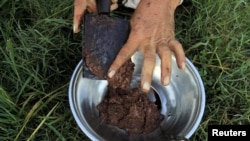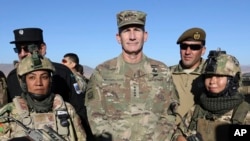The top U.S. general in Afghanistan said Saturday recently launched joint strikes against Taliban sources of revenue have destroyed more than $50 million worth of narcotics in southern Helmand province.
Afghanistan produces about 85 percent of the world’s opium. Income generated from drugs is providing 60 percent of the Taliban's funding, according to U.S. military estimates.
“Together in the last few weeks alone, we have destroyed over 50 million dollars worth of narcotics in Helmand. This is the Taliban’s financial engine and the Taliban drug cartels are now on notice that they are in our sights and we are coming after them,” said General John Nicholson.
The general commands American troops and NATO’s Resolute Support mission in the country.
The counternarcotics combined air and ground strikes began on November 19 and have since destroyed a number of factories and heroin processing labs. Nicholson said at the time authorities granted by President Donald Trump in August prompted the crackdown to curb terrorists and their revenue streams.
Helmand is the largest Afghan province and opium-poppy producing region, bordering Pakistan. Many of the districts in the volatile province are either controlled or influenced by the Taliban.
The Islamist insurgency, however, has denied any links to the illicit narcotics trade. The Taliban points to the historic reduction in poppy cultivation due to official eradication efforts when the Islamic group was ruling Afghanistan.
The U.S. has spent about $8.6 billion on narcotics eradication in Afghanistan since 2002, but the production has risen to historic levels.
The U.N. Office on Drugs and Crimes revealed in a new survey last month that narcotics production almost doubled in 2017 in Afghanistan to a record 9,000 tons, with a 63 percent increase in cultivation areas compared with 2016.
Narcotics trade fuels official corruption and undermines governance as well as rule of law in Afghanistan
U.S. officials say drugs lords provide weapons and funding to the Taliban in return for the protection of drug trade routes, cultivation fields, laboratories and trafficking organization. The Taliban, which controls or influences more than 40 percent of Afghan territory, generates revenue by taxing drugs trafficked through areas they control.
Critics say without eradicating opium production, U.S.-led efforts to eliminate terrorism and establish peace in Afghanistan will remain a daunting task. Afghan President Ashraf Ghani has stated that “the heroin is a very important driver” of the war in his country.





